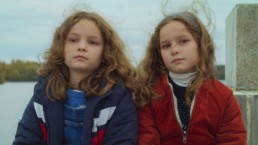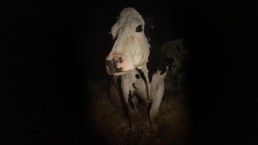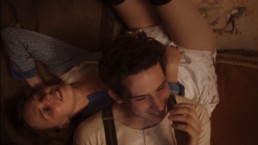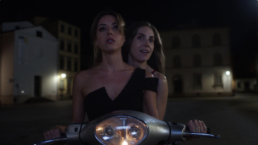'Petite Maman' is a Beautiful Storybook Tale of a Child's Grief
Our ‘Petite Maman’ review was first published as part of our Toronto International Film Festival 2021 coverage.
Where to watch: ‘Petite Maman’ opens this Friday, April 22nd, at the Landmark in West LA and The Grove.
Céline Sciamma returns to the big screen with an intimate portrait of a girl in mourning in Petite Maman. Scaled back in both story and scope in comparison to Sciamma's last feature, Petite Maman packs a plethora of emotional catharsis and full circle sweetness into its 72-minute runtime.
Related: 'Portrait of a Lady on Fire' Review: An Observant, Spectacular Beauty
A beautiful gliding one-shot establishes the environment our 8-year-old protagonist, Nelly (Joséphine Sanz), finds herself in: a nursing home on a dreary afternoon in the French countryside. She goes room to room, politely saying "Au revoir" to the elderly women that inhabit the home, and we quickly learn that Nelly's grandmother was a resident there until recently. Packing up the grandmother's humble belongings is Nelly's mother (Nina Meurisse), whose vacant eyes express her inability to accept this new reality.
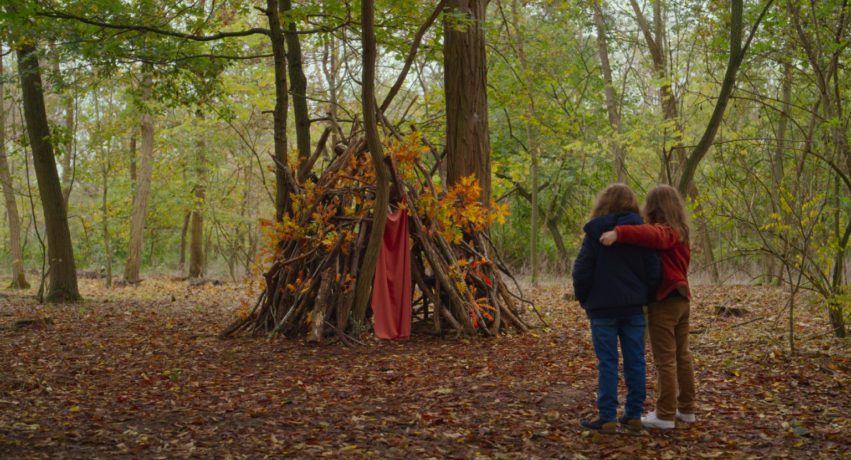
Upon returning to the family home, which Nelly's mother and father (Stéphane Varupenne) are tasked with clearing out, Nelly is free to roam throughout the untamed wilderness behind the house. Stumbling upon the fort that her mother constructed as a kid, Nelly meets another girl her age, Marion (Gabrielle Sanz). The two girls connect quickly, similar upbringings and temperaments make them fast friends but a few too many coincidences lead Nelly to question who Marion really is and soon learns that Marion's presence can offer her a sense of closure in her own life.
Is Marion real? A figment of Nelly's imagination? Or something more? Sciamma plays with these ideas early on but does a fantastic job of staying rooted in reality. Instead of leaning into the abstract sci-fi realm, she expands on the whimsicalness of childhood imagination and optimism (although the comparison to Netflix's Dark can be made whole-heartedly). Her signature themes of female companionship and emotional intimacy contribute to the film's most memorable moments, fitting nicely into her canon of highly impactful and poignant work.
Petite Maman is a beautiful story about a child's navigation through grief, told with a tenderness that quietly radiates with femininity and compassion.
72 min. Distributed by NEON.
'Cow' Captures the Boring, Beautiful Life of a Dairy Cow
Where to watch: ‘Cow' is now playing at the Lumiere Music Hall in Beverly Hills.
As humans, we have the uncanny ability to project our thoughts and feelings onto others. We do this subconsciously, of course, and usually with the best of intentions. Ryan, my brother and Cinemacy editor, names his plants. When I leave my dog Ernest at home to go to work, I feel guilty because I assume he is missing me all day long. Taking a step back, it's clear that we make these projections to make us feel better, or closer, to a thing that cannot communicate with us directly. It's a fascinating effect of our species' evolution, and this realization hit me even harder when watching Andrea Arnold's latest film, Cow.
Very similar to Viktor Kossakovsky's 2020 documentary Gunda, Cow is a meditative, slow-moving observation of the life cycle of a dairy cow. From birth to adolescence, motherhood to death, we witness it all. We are immediately transported to a working farm and stay there the entire runtime, practically able to smell the fresh manure and feel the briskness of the dawn mornings.
Related: 'Gunda' Review: A Wordless Film of a Mother Pig Stuns in Black and White
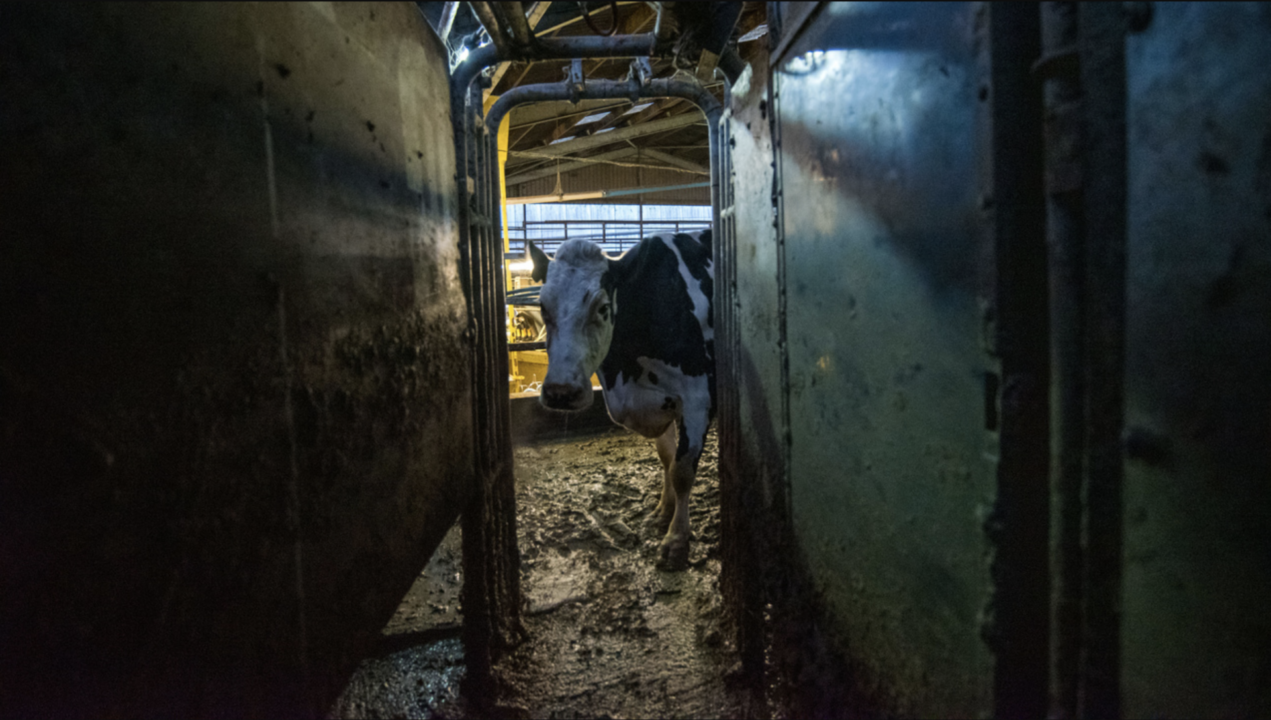
Since a cow is our main character, the film is obviously rather quiet–aside from a few moos. Yet in this silence, it's hard not to place our emotions and feelings onto this big, beautiful animal. Are the moos cries of pain or sadness when she is separated from her young calf? Is she confused or afraid when she gets branded and tagged? Of course, we can't read her mind to know what she's really thinking but what we can do is watch without objection or bias, and just observe.
Andrea Arnold is known for her provocative filmmaking, Fish Tank and American Honey being jarring depictions of coming of age stories. In this respect, Cow feels like a breath of fresh air for the director. The "Andrea Arnold" edge is still present in Cow, it's just far more tempered down and subtle.
Perhaps the Academy Award-winning filmmaker says it best. "This film is an endeavor to consider cows. To move us closer to them. To see both their beauty and the challenge of their lives. Not in a romantic way but in a real way. It’s a film about one dairy cow’s reality and acknowledging her great service to us. When I look at Luma, our cow, I see the whole world in her."
94 minutes. Distributed by IFC Films.
'Paris, 13th District' Explores Relationships Without Rules
Where to watch: ‘Paris, 13th District opens this Friday, April 15th at the Landmark Westwood in Los Angeles and select Laemmle theaters.
The beginning stages of any romantic relationship are often challenging to navigate. The endless "does he like me like I like him?" is met with "if he likes you, you'll know" but you never truly know so you're just confused. It's torture!
What Paris, 13th District (Les Olympiades) captures so honestly is this in-between stage that is so hard to define. Oscar-nominated director Jacques Audiard (The Sisters Brothers, Dheepan) explores the complexities of modern dating in this simple (mostly) black and white story of connection and loneliness.
Émilie (Lucie Zhang) is in a rut. A dead-end job as a telemarketer continuously has her in low spirits, which only worsens when she unexpectedly finds herself in need of a roommate. Then comes Camille (Makita Samba), a handsome schoolteacher who literally appears on her doorstep, also in need of a place to stay. The two become fast friends with benefits, toeing the line between love and lust, until their relationship comes to a screeching halt. Camille doesn't want a relationship. Not with Émilie, anyway.
Nearby, Nora (Noémie Merlant) is returning to school after growing bored of her career in real estate. An unfortunate case of mistaken identity sees her getting confused for cam girl Amber Sweet (Jehnny Beth), an identity that Nora is completely humiliated by. When her curiosity becomes too overwhelming, Nora seeks out her doppelganger and, much to her surprise, finds herself consumed by Amber's charm.
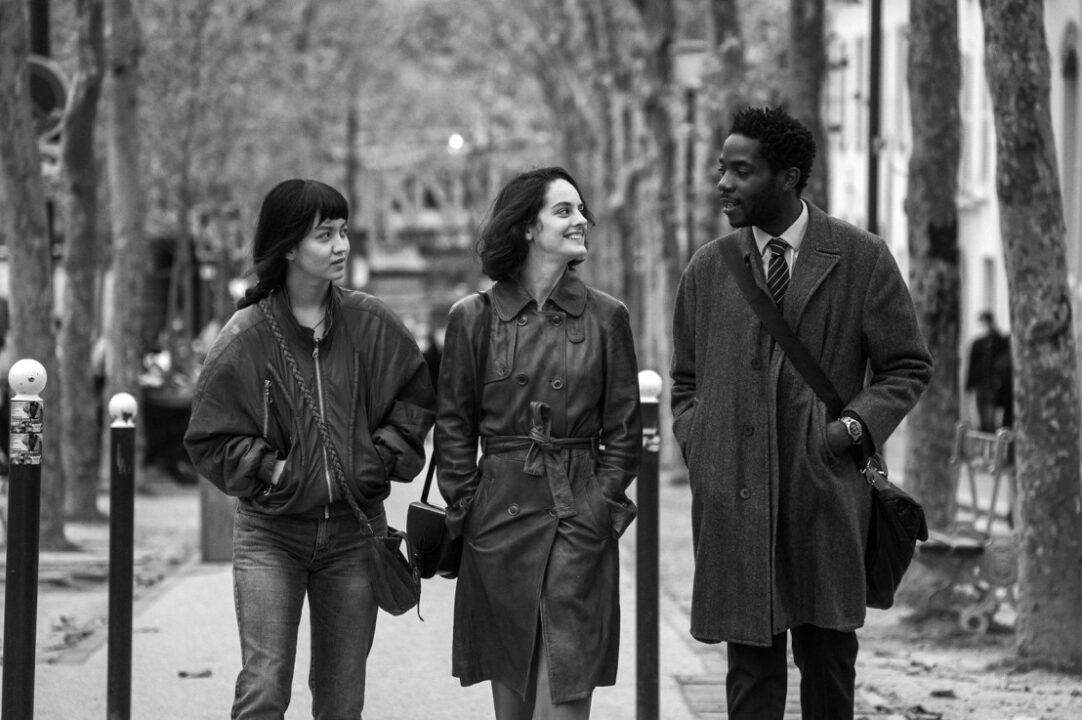
Now, this wouldn't be nearly as interesting a story if the lives of these four characters didn't intersect with each other. But they do. Raring hormones create intense sexual desire, but innate self-doubt casts a shadow on self-confidence. This leads to questioning their worthiness for love at all.
A love square consisting of three young women and one man, Paris, 13th District is a sexually charged dark comedy that tells the timeless story of relationship drama through the fresh eyes of our protagonists. The multicultural casting is a breath of fresh air, with special praise going to Noémie Merlant. It's becoming her niche to bare all – emotionally and physically – and she does it with such empathy here. A solid performance that is backed up by her equally engaging co-stars is further brought to life by the score from French electronic music producer Rone.
More and more modern couples are embracing sexual freedom and forgoing the traditional relationship structure; sometimes it works, sometimes it doesn't. Jacques Audiard weaves different narrative threads together to show how millennials are embracing rule-less relationships and creating special connections free from labels. Nominated for the Palm d'Or at the Cannes Film Festival this year, Paris, 13th District is a snapshot of cultural exploration and liberation.
Distributed by UniFrance. 'Paris, 13th District (Les Olympiades)' is awaiting a US release.
This review originally ran on November 15, 2021, during AFI FEST.
'Jane by Charlotte': A Love Letter to Mother-Daughter Relationships
Where to watch: 'Jane by Charlotte' opens this Friday, March 25th at the Landmark Westwood in Los Angeles and expands to additional cities in April. Available on Digital May 6th (Mother's Day weekend).
As children, we tend to view our mothers as a special type of superwoman. Flawless and invincible. But as we grow up, we begin to see the woman behind the "mom" moniker as less of an infallible hero and more of a human being. Charlotte Gainsbourg crosses this threshold of awareness with such intimacy and grace in the documentary, Jane by Charlotte–a film dedicated to her mother, Jane Birkin.
Both accomplished women in their own right, Birkin and Gainsbourg's relationship has been in the spotlight ever since Charlotte's birth in 1971. Inheriting her father Serge's famous surname, Charlotte followed her parents' footsteps into the world of film and music–perhaps best known for starring in numerous Lars Von Trier films such as Nymphomaniac and Antichrist, as well as for releasing a number of albums like "Rest" and "5:55."
But Charlotte's accomplishments are never highlighted in the film, and neither are her mother's. Rather, we're given a peek behind the curtain of fame and notoriety as we, very candidly, get to bear witness to the quiet, introspective conversations between a mother and her daughter.
Gainsbourg uses her eye as both a director and a daughter to look at her mom like never before; to see her as an objective subject, and not subjectively as her mother. The duo converses in various settings: backstage at a photoshoot, and at the family's childhood home. Topics are anything but dull. Throughout the film's 88 minute runtime, they discuss aging, motherhood, beauty standards, failed marriages, grief, life & death.
In watching Jane by Charlotte, we witness a mother and daughter falling deeper in love (and understanding) with each other. The film is no doubt very personal, evidenced by its subject matter and production quality. It is not heavily produced; instead, it feels much more organic and natural. Full of poignancy and sentiment, there is a moment towards the end when Charlotte takes a beat and reflects on the fortunate position she finds herself in. "I want to make the most of this luck," she says, "and make it last."
A love letter to mothers and daughters everywhere, Jane by Charlotte encourages us to look at our loved ones with both admiration as well as compassion. After all, we're all just human. Even our mothers.
88 min. Distributed by Utopia.
'Mothering Sunday' is a Sensual, Seductive Period Piece
This review originally ran on September 12, 2021, during TIFF
The words "I tried" aren't necessarily the ones you want to hear as a filmmaker introduces their film for the first time. But those were director Eva Husson's parting words as she recapped her experience making Mothering Sunday. Husson, whose previous film Bang Gang blew me away with its raw sexuality and uncompromising vision, teams up with writer Alice Birch (Normal People, Succession) to bring the story of a torrid love affair, adapted from the novel by Graham Swift, to the big screen. Try as they might, though, this one just didn't land with a bang (despite there being a lot of "banging").
Related: ‘Bang Gang’ Review: A Sun-Soaked Navigation Through Teenage Sexuality
Mothering Sunday takes place in England just after WWI, although it should be noted early on that this does not look or feel like a traditional period piece. Shot in a contemporary way with vibrant colors and mesmerizing use of lighting, Husson employs warm cinematic filters to give an old story new life.
The protagonist is Jane Fairchild (Odessa Young), an orphaned woman who works as a housemaid for a wealthy English couple, played by the incomparable Olivia Colman and Colin Firth. They treat Jane as their own, outwardly showing her affection (as much as one with a stiff upper lip can express) but it's the secret love she shares with the young aristocrat Paul Sheringham (Josh O'Connor) that truly makes her feel alive.
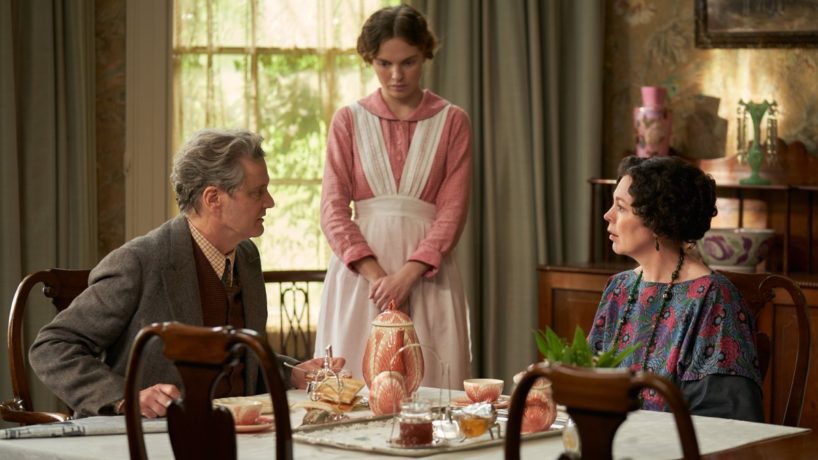
Their relationship is approaching its expiration date as Paul is set to marry another woman soon. Basking in the last moments they have left together, which includes poetic musings and rolling around naked, Paul and Jane make the most of their limited time together until a jarring accident prematurely ends things for good.
At this point, playing British aristocrats comes second nature to this central cast (O'Connor being The Crown's Prince Charles, Colman the series' Queen Elizabeth II as well as Queen Anne in The Favourite, and Firth playing King George VI in The King's Speech). This is to say that these fine actors do not disappoint here. Colman and Firth take on minor roles, initially leading me to question why exactly they had agreed to co-star in a film without much output, but my question was answered after each one had their show-stopping scene, complete with a dramatic monologue.
The biggest surprise was the moodiness of the film as a whole, which the score and cinematography by Jamie Ramsay contributed to greatly. Composer Morgan Kibby (of the French electro-rock band M83) re-teams with Husson to create a score that is quite unexpected for the time period, using orchestral strings layered with synth undertones, which is easily my favorite part of the film.
Unnecessary secondary storylines that take place decades later muddle the main crisis at the core of Mothering Sunday, watering down the film as a whole. Mothering Sunday would have been stronger had the film explored more of young Jane's conflicting feelings about grieving the loss of a man she was never supposed to have in the first place. Quietly mourning, feeling alone in your grief, abandoned by the one you love forever, these are powerful themes that resonated with me on a deep level. Had the focus remained on Jane at that time in her life, I can only imagine how much more affecting the story would have felt. Not all films need a happy ending, and Mothering Sunday is one of them.
Distributed by Sony Pictures Classics. Opening at the Landmark and AMC The Grove 14 on Friday, March 25th.
SXSW: 'Spin Me Round': Or, the Misadventures of Alison Brie Abroad
There's something to be said about a film that embraces a "low stakes energy" and has fun for fun's sake. That's what you get in Jeff Baena's latest, Spin Me Round. Baena (Life After Beth, The Little Hours) and Alison Brie team up again as co-writers, post-their 2020 indie darling Horse Girl, to tell a comedically awkward story of an idyllic trip gone very wrong.
Alison Brie plays Amber, a manager of an Italian restaurant chain in Sacramento, who has been selected to join other franchise managers in attending an all-expenses-paid, educational immersion program in Italy. Her initial excitement and expectation that this would be the trip of a lifetime quickly become less romantic and more questionable when faced with the reality of this "opportunity". The accommodations are barely a step above a sub-par college dormitory, the hosts of the program don't really seem to know what they're doing, and the local celebrity chef (Alessandro Nivola) and his assistant (Aubrey Plaza) seem to be overly fascinated in alienating the women from the program for their own personal pleasure. Something's off here.
Where Baena and Brie take this film is never totally clear, and that's the fun to be had. We don't know where we're going and the final reveal is completely off-the-wall bonkers (you'll never see it coming). While the humor from the script only takes the film so far, what pushes it to LOL territory is the who's who in the ensemble cast. Spin Me Round enlists some of the best comedy actors working today, including Molly Shannon, Zach Woods, Tim Heidecker, Debby Ryan, and Fred Armisen.
In the small Baena/Brie canon, however, Spin Me Round falls short compared to their first feature Horse Girl. Sure, these two movies serve different purposes and can't be matched head to head, but Spin Me Round lacks the vibrance and memorability that Horse Girl was able to so effortlessly give. Baena's latest (which is executive produced by the indie film dynamic duo, Mark and Jay Duplass) is good for a few laughs while watching, but it's not the most memorable of trips to be had.
SXSW: 'Brené Brown: Atlas of the Heart' Continues to Unpack Emotions
In this special sneak peek of the upcoming HBO Max series Atlas of the Heart (based on the book of the same name), social researcher, TED Talk celebrity, and all-around incredible human being Brené Brown takes center stage to discuss what she knows best: emotions. Using film and TV clips to aid in the process, Brené's thesis statement in this new series is to identify and name the 30 emotions we routinely feel in our lifetime.
"We are emotional beings rather than thinking beings," she states–evidenced by the fact that we neurologically process emotional pain the same as physical. We can feel many things at once, but putting a singular name to those feelings proves more difficult in practice. Asking her intimate live audience how many emotions they can name, the median number falls around 5. However, there are 30 identifiable emotions that Brené sets out to define, and not all emotions are equal.
As Brown goes on to say, language is the portal to correctly identifying how we're feeling. Once we master this, we'll have the ability to better connect with ourselves and, in turn, each other. One of the most fascinating segments within this first episode is the study of the word "anguish." Anguish, although sometimes felt concurrently with sadness, is not the same emotion as sadness. Brené uses various forms of mixed media to illustrate how anguish is interpreted by artists, poets, and educators, further proving that anguish is as interchangeable to sad as hot is to cold. It's not.
Another moment that really makes you think is Brené's distinction between "awe" and "wonder." Sharing iconic moments from Disney's Coco, The Wizard of Oz, Gravity, E.T., and Forrest Gump, among others, Brené points out the subtle yet paramount difference between the two emotions. Boiled down, "awe" equals observational, "wonder" equals curiosity.
Brené's natural charm and charisma make this short 40-minute episode a breeze to get through. Similar to a TED Talk, she shares her discovery in front of a small audience, encouraging them to share their thoughts about the research along the way. This engaging format seamlessly translates from the stage, even watching from home I couldn't help but feel compelled to answer Brené's calls.
Fans of Brown's will be thrilled to know that Atlas of the Heart is a continuation of her beloved and respected findings on how emotions play a role in society. In watching this series, even just one episode, you will come away having learned something truly useful that offers a deeper understanding of yourself and those around you.
SXSW: 'Self-Portrait' is a Voyeuristic Symphony of Our Daily Lives
Someone is always watching. In director Joële Walinga's experimental film Self-Portrait, hundreds (possibly thousands, I couldn't keep track) of film clips from surveillance cameras around the world are weaved together to illustrate a "candid peek of humanity," per the film's SXSW summary.
A seemingly nice sentiment–especially on the heels of quarantine–the film's offering of connectedness is what drew me in initially. As the credits rolled, however, I found the film's existence to be much more voyeuristic, making a darker statement that forces you to realize just how much, and how often, you're being watched.
The film itself is a montage of real moments captured globally through unlocked surveillance cameras. With no narrative structure in place, no real story being told, we embark on a worldwide journey via footage stitched together with its original audio. We hear the mumble of kids playing on a suburban street, see a flock of birds blissfully idle in the sky, listen to Christmas music playing at an outdoor market, and watch the rising tides of the ocean.
Both soothing is its uninterrupted observation of nature and claustrophobic in its intrusive, omniscient presence, Self-Portrait gives us many ways to interpret its message.

